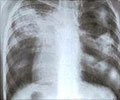Amniocentesis - Procedure
The procedure involves in getting a small sample of "amniotic fluid" from around the fetus. The details are as follows:
- Local anesthesia is used for the procedure.
- It is done under strict aseptic condition.
- A thin needle of 21 or 22 gauge needle is inserted under ultrasound imaging guidance to aspirate the fluid.
- A sample of the amniotic fluid (about 20-30 cc) is then withdrawn through the needle.
- The amniotic fluid contains cells called "Fetal Fibroblasts", which are shed by the developing baby.
- The cells are drawn into a plastic syringe and taken to a laboratory.
- These cells are allowed to grow and multiply in a laboratory until there are enough for the test.
- The level of AFP (Alfa Feto Protein) in the amniotic fluid is also checked, to look for neural tube defects.
- Genetic analysis through amniocentesis is highly accurate but occasionally results may not be obtained.
- As there is very mild to no pain, there is seldom any need for medication after the procedure.












